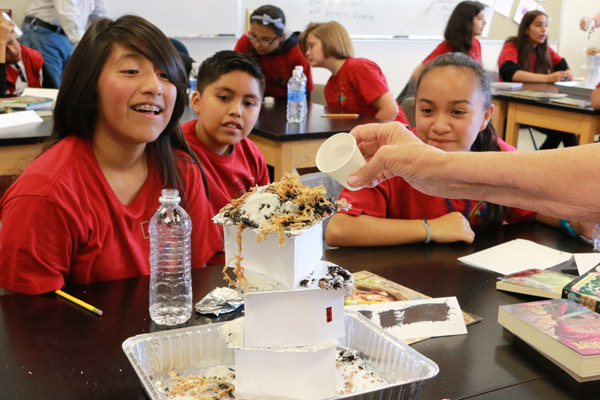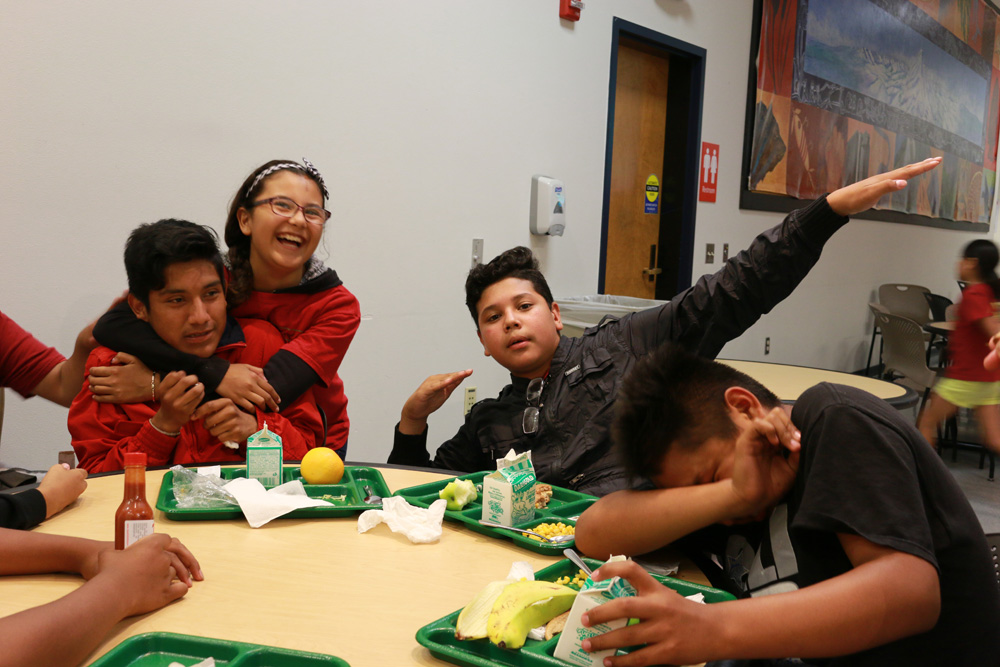If you had gone to the campus of Mount Vernon’s Skagit Valley College in the first weeks of summer, you would have seen that even though school was over, the learning was not.
When SOWA visited on July 18th, we came upon a cacophonous room full of school-age children banging on drums while a smiling teaching artist in the center helped them keep the beat.
In another room, the middle- and high-school-aged students were in the middle of a STEM activity, learning about the environment and engineering by building model structures with ‘green roofs’ that absorb rainwater into growing plants rather than letting it run off into streams and rivers.
All of the kids were wearing red t-shirts emblazoned with a picture of a cardinal giving a thumbs-up—Skagit Valley College’s mascot—and the words “Aprende en tu colegio,” Spanish for “Learn at your college.”

Nearly all of the 197 kids at Summer Academy 2016, a program of the Foundation for Academic Endeavors, are Latinos whose parents work in Skagit County’s agricultural industry, often for twelve hours a day in the summer months. This is a community with low graduation rates and a high level of poverty.
“A lot of these kids have never been on a college campus before,” said Carol Rodin, a board member with the Foundation and one of four co-administrators of Summer Academy 2016. She said her organization hopes to instill in these children that this campus is a part of their education, that this is a place they are welcome.
Skagit Valley College graciously provided space for Summer Academy 2016, but they’re just one institution that’s come together to make summer learning in Skagit a reality. Summer Academy 2016 received funding and volunteers from at least eight different churches across Western Washington. The Mount Vernon and Burlington School districts both provided school buses to transport students from their homes across Skagit, as well as child-sized furniture not usually found on college campuses. Family Promise, a homeless assistance organization, also lent them use of a smaller van to transport pre-school-aged children.
Summer Academy 2016 also received support from School’s Out Washington, one of ten organizations in Washington’s rural communities that received funding as a part of our Feed Your Brain grant. Our support meant the Foundation was able to bring on certified teachers, improving the quality of the experience for the children. Among them were two teachers trained in Mexico, now residing in Skagit County, able to work with the children in their own native language.
Also, SOWA has partnered with Page Ahead to provide each participating child at our Feed Your Brain sites with four brand-new free books during the program. Many of these children have a limited home library, and these books from Page Ahead allow them to grow their love of reading.
Another core value of Feed Your Brain is connecting summer programs with the USDA Summer Food Service program. Many children that depend on free or reduced price meals during the school year are at risk for going hungry during the summer months. The children at Summer Academy 2016 all receive free breakfast and lunch as a part of this federally-funded program, staffed by cafeteria workers from the Mount Vernon School District.

There is plenty of unmet demand for summer learning programs in Skagit’s Latino farmworker community. Robin Ringland, the Foundation’s Board President and co-administrator, told us that Mount Vernon has 900 children their school district believes should be attending summer school, but only have space for 100 at their own programs.
This is common in Washington’s rural areas. In many communities, summer learning programs funded by Feed Your Brain are the only game in town.
Foundation board members and academy co-administrators Rosario Aguilar and Marlene Kurtz Rios went door to door recruiting families to send their children to the Summer Academy. Aguilar said registration was slow at first, as parents weren’t sure what to think of it. But as soon as one parent was convinced, she said, word spread through their community and everything changed all at once. Ringland said registration climbed so much in one day that they had to reserve two extra rooms at the college!
The Foundation expected Summer Academy 2016 would serve about 100 children. As of July 18th, they’d served at least 196.
For Aguilar, the reward of this work is the hope that some of these kids will be ready for college when they graduate, and not be intimidated by the institution.
“They’re not afraid to go to college,” she told us through a translator. “They’ve already been to college.”
